11 july 2019

The IDF issues statement saying the troops stationed at the border mistakenly identified a 'restrain operative' along the security fence as an armed terrorist; Hamas threatened Israel with retaliation as a result of the shooting
The fatal shooting of a Hamas operative by Israeli troops along the Gaza border, appears to have been a result of a "misunderstanding," the military said in a statement Thursday.
IDF troops shot and killed a Palestinian near the border fence in the northern Gaza Strip earlier on Thursday, prompting Hamas - who claim the man killed was their operative - to threaten Israel with retaliation.
“Two Palestinians approached the area of the border fence earlier in the morning in the northern Gaza Strip, behind them was a Hamas restraint operative, who was supposed to take the men back to Gaza,” said the IDF Spokesperson’s Unit in a statement.
"An initial inquiry suggests that the IDF troops who arrived at the location misidentified the Hamas restraint operative to be an armed terrorist and fired as a result of this misunderstanding. The incident will be reviewed," it said.
"We will not allow this shooting to go without a response, and Israel will pay for its actions," the terror group said in a statement. "Israel intentionally fired at one of our members while he was carrying out his duties. We've launched an investigation into this crime."
The incident comes just as a senior Egyptian intelligence delegation was due to enter the Gaza Strip to discuss the agreement for calm with Israel, and also to restart reconciliation talks between Hamas and Fatah. These meetings were planned before today's shooting, but could now potentially be undermined by Hamas' response.
The Egyptian delegation will first meet with Palestinian Authority President Mahmoud Abbas and other senior Fatah officials in Ramallah, as well as possibly meeting with senior Israeli defense officials.
The killing of the gunman comes just as a temporary ceasefire agreement between the two sides has come into effect between Israel and Hamas, which was preceded by over 100 fires in southern Israel which broke out as a result of incendiary balloons launched from Gaza.
However, recent data from Israeli authorities show that the number of fires caused by incendiary balloons from Gaza have gone down in 2019, compared to 2018.
The fatal shooting of a Hamas operative by Israeli troops along the Gaza border, appears to have been a result of a "misunderstanding," the military said in a statement Thursday.
IDF troops shot and killed a Palestinian near the border fence in the northern Gaza Strip earlier on Thursday, prompting Hamas - who claim the man killed was their operative - to threaten Israel with retaliation.
“Two Palestinians approached the area of the border fence earlier in the morning in the northern Gaza Strip, behind them was a Hamas restraint operative, who was supposed to take the men back to Gaza,” said the IDF Spokesperson’s Unit in a statement.
"An initial inquiry suggests that the IDF troops who arrived at the location misidentified the Hamas restraint operative to be an armed terrorist and fired as a result of this misunderstanding. The incident will be reviewed," it said.
"We will not allow this shooting to go without a response, and Israel will pay for its actions," the terror group said in a statement. "Israel intentionally fired at one of our members while he was carrying out his duties. We've launched an investigation into this crime."
The incident comes just as a senior Egyptian intelligence delegation was due to enter the Gaza Strip to discuss the agreement for calm with Israel, and also to restart reconciliation talks between Hamas and Fatah. These meetings were planned before today's shooting, but could now potentially be undermined by Hamas' response.
The Egyptian delegation will first meet with Palestinian Authority President Mahmoud Abbas and other senior Fatah officials in Ramallah, as well as possibly meeting with senior Israeli defense officials.
The killing of the gunman comes just as a temporary ceasefire agreement between the two sides has come into effect between Israel and Hamas, which was preceded by over 100 fires in southern Israel which broke out as a result of incendiary balloons launched from Gaza.
However, recent data from Israeli authorities show that the number of fires caused by incendiary balloons from Gaza have gone down in 2019, compared to 2018.
4 july 2019
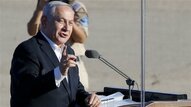
Israeli Prime Minister Benjamin Netanyahu has threatened a “large-scale” military offensive against the Gaza Strip.
Netanyahu claimed Wednesday that Israel wants to “restore calm,” but “same time we are preparing for a large-scale military operation, if such an action is required.”
“Those are my instructions to the army,” he added.
The hawkish premier made the remarks after a cabinet meeting to discuss the situation in the besieged coastal enclave. Netanyahu also held a meeting with local and regional council heads, some of whom left the meeting in protest.
“The prime minister had no intention of holding a special meeting on the Gaza envelope area as expected and as requested today,” they said.
The rockets fired from Gaza in response to frequent Israeli acts of aggression have turned into a major challenge for Netanyahu, who is grappling with corruption scandals and whose failure to form an administration has plunged the regime into unprecedented political chaos.
In May, Israeli warplanes struck hundreds sites in Gaza, killing scores of Palestinian people.
Israeli aerial raids on Gaza prompted the most intense fighting between the regime and the Palestinian resistance fighters since Tel Aviv’s bloody war on the blockaded enclave in 2014.
In retaliation, the Palestinian fighters fired around 700 rockets from Gaza into the occupied territories, killing four Israeli settlers and injuring at least 80 others.
Israeli media reported that Israel’s so-called Iron Dome missile system intercepted only 240 of the projectiles, adding that some 35 rockets and mortar shells had struck populated areas.
Gaza has been under Israeli siege since June 2007, which has caused a decline in living standards. Israel has launched three major wars against the enclave since 2008, killing thousands of Gazans and shattering the impoverished territory’s already poor infrastructure.
Netanyahu claimed Wednesday that Israel wants to “restore calm,” but “same time we are preparing for a large-scale military operation, if such an action is required.”
“Those are my instructions to the army,” he added.
The hawkish premier made the remarks after a cabinet meeting to discuss the situation in the besieged coastal enclave. Netanyahu also held a meeting with local and regional council heads, some of whom left the meeting in protest.
“The prime minister had no intention of holding a special meeting on the Gaza envelope area as expected and as requested today,” they said.
The rockets fired from Gaza in response to frequent Israeli acts of aggression have turned into a major challenge for Netanyahu, who is grappling with corruption scandals and whose failure to form an administration has plunged the regime into unprecedented political chaos.
In May, Israeli warplanes struck hundreds sites in Gaza, killing scores of Palestinian people.
Israeli aerial raids on Gaza prompted the most intense fighting between the regime and the Palestinian resistance fighters since Tel Aviv’s bloody war on the blockaded enclave in 2014.
In retaliation, the Palestinian fighters fired around 700 rockets from Gaza into the occupied territories, killing four Israeli settlers and injuring at least 80 others.
Israeli media reported that Israel’s so-called Iron Dome missile system intercepted only 240 of the projectiles, adding that some 35 rockets and mortar shells had struck populated areas.
Gaza has been under Israeli siege since June 2007, which has caused a decline in living standards. Israel has launched three major wars against the enclave since 2008, killing thousands of Gazans and shattering the impoverished territory’s already poor infrastructure.
14 june 2019
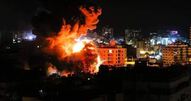
Israeli warplanes at dawn Friday bombed two sites in the besieged Gaza Strip, with no reported casualties.
A reporter for the Palestinian Information Center (PIC) said that a warplane fired at least three missiles at a resistance post in the east of al-Zeitoun neighborhood, southeast of Gaza City.
Another barrage of air-to-surface missiles targeted the new Gaza seaport in the south.
Explosions heard during the airstrikes, amid intensive overflights.
The Israeli occupation army claimed its aerial attacks came after a rocket fired from Gaza hit a building in Sderot settlement, north of Gaza.
A reporter for the Palestinian Information Center (PIC) said that a warplane fired at least three missiles at a resistance post in the east of al-Zeitoun neighborhood, southeast of Gaza City.
Another barrage of air-to-surface missiles targeted the new Gaza seaport in the south.
Explosions heard during the airstrikes, amid intensive overflights.
The Israeli occupation army claimed its aerial attacks came after a rocket fired from Gaza hit a building in Sderot settlement, north of Gaza.
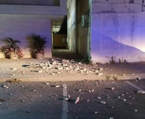
On Thursday, Israeli sources have reported that a rocket, reportedly fired from the Gaza Strip, struck a building in the Israeli Negev town of Sderot, causing damage.
Israeli daily Haaretz said the building which was struck by the rocket is part of a religious school, and that the building sustained structural damage; no injuries were reported.
It also stated that the rocket sirens were sounded in Sderot and Sha’ar HaNegev settlements, close to the border with Gaza.
Earlier Thursday, the Israeli army fired missiles at a tunnel on the Gaza border, and damaged it, and said the strike came “in retaliation to shells fired from Gaza” on Wednesday at night.
On Thursday at dawn, the army fired several missiles into Palestinian lands in Gaza city, and Rafah in the southern part of the coastal region, causing damage to nearby homes and buildings.
It is worth mentioning that, on Wednesday, the army imposed a strict maritime siege on the coastal region until further notice, for what it called “the ongoing flying of incendiary balloons from Gaza into Israel.”
Israeli daily Haaretz said the building which was struck by the rocket is part of a religious school, and that the building sustained structural damage; no injuries were reported.
It also stated that the rocket sirens were sounded in Sderot and Sha’ar HaNegev settlements, close to the border with Gaza.
Earlier Thursday, the Israeli army fired missiles at a tunnel on the Gaza border, and damaged it, and said the strike came “in retaliation to shells fired from Gaza” on Wednesday at night.
On Thursday at dawn, the army fired several missiles into Palestinian lands in Gaza city, and Rafah in the southern part of the coastal region, causing damage to nearby homes and buildings.
It is worth mentioning that, on Wednesday, the army imposed a strict maritime siege on the coastal region until further notice, for what it called “the ongoing flying of incendiary balloons from Gaza into Israel.”
13 june 2019
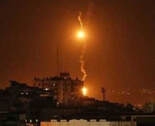
Israeli soldiers fired, on Thursday at dawn, several missiles into Palestinian lands in Gaza city, and Rafah in the southern part of the coastal region, causing damage to nearby homes and buildings.
Media sources said the Israeli missiles did not lead to casualties, but caused damage to some homes and structures near the targeted areas.
They added that the soldiers also fired two artillery shells into farmlands, east of Khan Rafah, causing damage,
Israel also ordered Gaza coastal waters shut until further notice, preventing the residents, including the fishermen, from entering Palestinian waters, “in response to flammable balloons and kites flown from Gaza into nearby Israeli area.”
The Israeli army said a shell was fired from Gaza, during late night hours Wednesday, before the Iron Dome missile interception system managed to detonate it.
Media sources said the Israeli missiles did not lead to casualties, but caused damage to some homes and structures near the targeted areas.
They added that the soldiers also fired two artillery shells into farmlands, east of Khan Rafah, causing damage,
Israel also ordered Gaza coastal waters shut until further notice, preventing the residents, including the fishermen, from entering Palestinian waters, “in response to flammable balloons and kites flown from Gaza into nearby Israeli area.”
The Israeli army said a shell was fired from Gaza, during late night hours Wednesday, before the Iron Dome missile interception system managed to detonate it.
16 may 2019
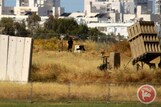
The Israeli army deployed its Iron Dome aerial defense system batteries throughout the country, on Thursday, as the Eurovision song contest kicked off earlier this week.
The Iron Dome batteries were deployed around Israel, specifically in southern Israel as Eurovision’s semi-finals kicked off on Tuesday May 14th and will hold its finals on Saturday May 18th.
The Hamas movement and the Palestinian Islamic Jihad movement warned Israel against any possible attacks during the Eurovision song contest.
According to Haaretz news outlet, Israeli army reservists have been activated to man the Iron Dome and will remain during Eurovision.
The Iron Dome batteries were deployed around Israel, specifically in southern Israel as Eurovision’s semi-finals kicked off on Tuesday May 14th and will hold its finals on Saturday May 18th.
The Hamas movement and the Palestinian Islamic Jihad movement warned Israel against any possible attacks during the Eurovision song contest.
According to Haaretz news outlet, Israeli army reservists have been activated to man the Iron Dome and will remain during Eurovision.
6 may 2019
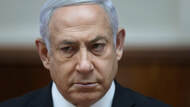
PM: IDF struck more than 350 targets during latest round of fighting; defense source says Hamas and Islamic Jihad sought ceasefire after they understood 'the rules of the game had changed'
Israel's campaign against Palestinian terror groups in Gaza is not over, Prime Minister Benjamin Netanyahu said Monday, as a ceasefire, while not officially confirmed, appeared to take hold after almost three days of escalating violence between the Jewish state and the Hamas-run enclave.
"Over the last two days we struck Hamas and Islamic Jihad with great force," Netanyahu said in a statement released by his office.
"We hit over 350 targets. We struck at terrorist leaders and operatives and we destroyed terrorist buildings," the statement said.
"The campaign is not over and it demands patience and sagacity. We are prepared to continue," he said. "The goal has been – and remains – ensuring quiet and security for the residents of the south. I send condolences to the families and best wishes for recovery to the wounded.”
The escalation began on Friday, when two Israeli soldiers were wounded by Gaza gunfire near the Gaza-Israel border. A retaliatory IAF strike killed two militants from the Hamas group that governs Gaza. Two other Palestinians protesting near the frontier were also killed by IDF forces.
By the time the fighting appeared to be over on Monday morning, four Israelis had been killed and more than 700 rockets and missiles were fired from Gaza.
Meanwhile, an Israeli security source said Monday that the Gaza organizations had sought a ceasefire out of fear over what Israel would do in the Strip.
"Hamas and Islamic Jihad understood very well that the rules of the game had changed," the source said. "Therefore, they stopped firing (rockets) on their own initiative after repeated requests for a ceasefire."
Kulanu Minister Eli Cohen, who is a member of the security cabinet, said Monday that Israel must remove Hamas' grip on Gaza.
"It is clear to us all that the next round (of fighting) will come," Cohen said. "Hamas is a terrorist organization and we should focus on ending its rule."
Cohen also said that ousting Hamas from Gaza would require military action and not diplomacy.
"We need to be ready at the start of the next round," he said, citing the use of targeted assassinations, which Israel employed for the first time since 2014.
"Those who think that we are heading for a diplomatic settlement have failed to understand the reality," Cohen said.
"We have to strike at the heads of Hamas, the heads of the snake. We expect a major battle, which is crucial for the residents of the south who are held hostage by Hamas and Jihad - and we will decide when that will be."
Israelis living near Gaza border angry about ceasefire
Residents feel ignored, that Eurovision set the agenda and government agreed to truce because it did not want rockets raining down during Independence Day holiday
There was anger and dismay on the Israeli side of the Gaza border on Monday after two days of rocket blasts and air-raid sirens that ended with a ceasefire.
The dawn deal restored general calm after a barrage of nearly 700 Hamas and Islamic Jihad rockets, the most serious outbreak of violence between Israel and Palestinian militants for months.
But the cessation was greeted with little enthusiasm in the Israeli cities, towns and villages where Israelis were fuming, as well as weary of having to run to shelters.
"In a month, in two weeks, in a month and a half, it will all happen again - we achieved nothing. I think Israel needs to strike them very, very hard so that they learn their lesson," said Haim Cohen, 69, a retired electrician from the coastal city of Ashdod 15 miles (25 km) north of the Gaza Strip.
Behind him, cleaners were sweeping shattered glass outside a house where an Israeli was killed by a Gaza rocket on Sunday when running for cover. He was one of four Israelis killed.
"I think that this is Netanyahu's failure. I regret convincing people top vote for him," said Baruch from Ashkelon. "What have we received? The bodies of our missing soldiers and captives? No. we got 700 rockets and frightened children… Gaza decides when to start a war and when to end it," he said, to nods of assent of his neighbors.
Mor, a resident of Netivot, expressed surprise that the Home Front Command allowed for children to return to school with so short notice. "We fled to the center of the country believing we would stay there for a few days. Suddenly this morning we saw the notice and began getting ready to leave for home. It isn’t right to open kindergartens with such short notice. The staff are not the usual staff that our kids are familiar with and its all one big emotional roller coaster for them," she complained.
Residents of Sderot, who are used to the situation more than others, also expressed bitterness at the way events unfolded. "I do not believe in this ceasefire. There is always hope but this isn’t our first time. We are living this reality for so many years, but the latest round was unusual even for us," said Shula, a local resident.
Speaking about the IDF airstrikes against Hamas and Islamic Jihad targets in Gaza, Prime Minister Benjamin Netanyahu said: "we hit them hard," before adding: "This his not yet over and patience and good judgement are necessary. We are preparing for the continuation. The goal was and remains to ensure quiet and security for residents of the South. I send my condolences to the families of those killed and well wishes to the injured."
A security official added that the terror groups were surprised by the force Israel applied and did not properly evaluate the Israeli reaction to their provocations. "Hamas and Islamic Jihad understood that the rules of the game have changed and therefore ceased firing on their own initiative after repeated requests (ignored by Israel) for a ceasefire."
IDF Chief of Staff Aviv Kochavi noted that the IDF "destroyed hundreds of terror targets in Gaza over the last two days, including command centers, weapons stores and infrastructure."
The Islamist Hamas seized control of Gaza in 2007, two years after Israel pulled its troops and settlers out of the small coastal enclave. Since then, the two sides have waged three wars and engaged in repeated tit-for-tat barrages.
Some Israelis who live close to the Gaza border believed their government agreed to a truce with Hamas because it did not want rockets raining down during the upcoming Independence Day holiday, or the Eurovision Song Contest finals that begin on May 14 in Tel Aviv, just 50 miles (80 km) up the coast from Gaza.
"Eurovision set the agenda and not us, the residents of the south," said Ofer Liberman, from Nir-am, a kibbutz - or agricultural village - near northern Gaza. He said he felt abandoned, adding: "I want the government to make Hamas too scared to launch rockets at us."
"I think that a ceasefire is a mistake. You don't do a ceasefire with a terrorist organization. If this cycle isn't finished properly and if Gaza isn't cleansed of these terrorists then nothing will help," said Jack Mandel, 57.
In Ein Hashlosha, a kibbutz about a mile and a half from Gaza, Meirav Kohan, 46, said she was shocked and disappointed at the truce.
"This is a war of attrition and the government is not looking for a long-term solution to bring us peace. There's no policy. We're just pawns in a game," she said.
Israel's campaign against Palestinian terror groups in Gaza is not over, Prime Minister Benjamin Netanyahu said Monday, as a ceasefire, while not officially confirmed, appeared to take hold after almost three days of escalating violence between the Jewish state and the Hamas-run enclave.
"Over the last two days we struck Hamas and Islamic Jihad with great force," Netanyahu said in a statement released by his office.
"We hit over 350 targets. We struck at terrorist leaders and operatives and we destroyed terrorist buildings," the statement said.
"The campaign is not over and it demands patience and sagacity. We are prepared to continue," he said. "The goal has been – and remains – ensuring quiet and security for the residents of the south. I send condolences to the families and best wishes for recovery to the wounded.”
The escalation began on Friday, when two Israeli soldiers were wounded by Gaza gunfire near the Gaza-Israel border. A retaliatory IAF strike killed two militants from the Hamas group that governs Gaza. Two other Palestinians protesting near the frontier were also killed by IDF forces.
By the time the fighting appeared to be over on Monday morning, four Israelis had been killed and more than 700 rockets and missiles were fired from Gaza.
Meanwhile, an Israeli security source said Monday that the Gaza organizations had sought a ceasefire out of fear over what Israel would do in the Strip.
"Hamas and Islamic Jihad understood very well that the rules of the game had changed," the source said. "Therefore, they stopped firing (rockets) on their own initiative after repeated requests for a ceasefire."
Kulanu Minister Eli Cohen, who is a member of the security cabinet, said Monday that Israel must remove Hamas' grip on Gaza.
"It is clear to us all that the next round (of fighting) will come," Cohen said. "Hamas is a terrorist organization and we should focus on ending its rule."
Cohen also said that ousting Hamas from Gaza would require military action and not diplomacy.
"We need to be ready at the start of the next round," he said, citing the use of targeted assassinations, which Israel employed for the first time since 2014.
"Those who think that we are heading for a diplomatic settlement have failed to understand the reality," Cohen said.
"We have to strike at the heads of Hamas, the heads of the snake. We expect a major battle, which is crucial for the residents of the south who are held hostage by Hamas and Jihad - and we will decide when that will be."
Israelis living near Gaza border angry about ceasefire
Residents feel ignored, that Eurovision set the agenda and government agreed to truce because it did not want rockets raining down during Independence Day holiday
There was anger and dismay on the Israeli side of the Gaza border on Monday after two days of rocket blasts and air-raid sirens that ended with a ceasefire.
The dawn deal restored general calm after a barrage of nearly 700 Hamas and Islamic Jihad rockets, the most serious outbreak of violence between Israel and Palestinian militants for months.
But the cessation was greeted with little enthusiasm in the Israeli cities, towns and villages where Israelis were fuming, as well as weary of having to run to shelters.
"In a month, in two weeks, in a month and a half, it will all happen again - we achieved nothing. I think Israel needs to strike them very, very hard so that they learn their lesson," said Haim Cohen, 69, a retired electrician from the coastal city of Ashdod 15 miles (25 km) north of the Gaza Strip.
Behind him, cleaners were sweeping shattered glass outside a house where an Israeli was killed by a Gaza rocket on Sunday when running for cover. He was one of four Israelis killed.
"I think that this is Netanyahu's failure. I regret convincing people top vote for him," said Baruch from Ashkelon. "What have we received? The bodies of our missing soldiers and captives? No. we got 700 rockets and frightened children… Gaza decides when to start a war and when to end it," he said, to nods of assent of his neighbors.
Mor, a resident of Netivot, expressed surprise that the Home Front Command allowed for children to return to school with so short notice. "We fled to the center of the country believing we would stay there for a few days. Suddenly this morning we saw the notice and began getting ready to leave for home. It isn’t right to open kindergartens with such short notice. The staff are not the usual staff that our kids are familiar with and its all one big emotional roller coaster for them," she complained.
Residents of Sderot, who are used to the situation more than others, also expressed bitterness at the way events unfolded. "I do not believe in this ceasefire. There is always hope but this isn’t our first time. We are living this reality for so many years, but the latest round was unusual even for us," said Shula, a local resident.
Speaking about the IDF airstrikes against Hamas and Islamic Jihad targets in Gaza, Prime Minister Benjamin Netanyahu said: "we hit them hard," before adding: "This his not yet over and patience and good judgement are necessary. We are preparing for the continuation. The goal was and remains to ensure quiet and security for residents of the South. I send my condolences to the families of those killed and well wishes to the injured."
A security official added that the terror groups were surprised by the force Israel applied and did not properly evaluate the Israeli reaction to their provocations. "Hamas and Islamic Jihad understood that the rules of the game have changed and therefore ceased firing on their own initiative after repeated requests (ignored by Israel) for a ceasefire."
IDF Chief of Staff Aviv Kochavi noted that the IDF "destroyed hundreds of terror targets in Gaza over the last two days, including command centers, weapons stores and infrastructure."
The Islamist Hamas seized control of Gaza in 2007, two years after Israel pulled its troops and settlers out of the small coastal enclave. Since then, the two sides have waged three wars and engaged in repeated tit-for-tat barrages.
Some Israelis who live close to the Gaza border believed their government agreed to a truce with Hamas because it did not want rockets raining down during the upcoming Independence Day holiday, or the Eurovision Song Contest finals that begin on May 14 in Tel Aviv, just 50 miles (80 km) up the coast from Gaza.
"Eurovision set the agenda and not us, the residents of the south," said Ofer Liberman, from Nir-am, a kibbutz - or agricultural village - near northern Gaza. He said he felt abandoned, adding: "I want the government to make Hamas too scared to launch rockets at us."
"I think that a ceasefire is a mistake. You don't do a ceasefire with a terrorist organization. If this cycle isn't finished properly and if Gaza isn't cleansed of these terrorists then nothing will help," said Jack Mandel, 57.
In Ein Hashlosha, a kibbutz about a mile and a half from Gaza, Meirav Kohan, 46, said she was shocked and disappointed at the truce.
"This is a war of attrition and the government is not looking for a long-term solution to bring us peace. There's no policy. We're just pawns in a game," she said.

Palestinian officials said that a ceasefire agreement has been reached with the Israeli occupation after three days of deadly attacks on the Gaza Strip.
A well-informed source told the PIC reporter that the United Nations, Qatar and Egypt helped mediate an end to the three-day aggression.
The Gaza-based al-Aqsa TV channel said that the ceasefire agreement came into effect at 4:30 am on Monday, and no Israeli raids on the besieged area have been reported ever since.
According to Gaza's Ministry of Health, 25 Palestinian civilians, including two pregnant mothers and three infants, were killed in the attacks, and at least 150 injured.
Israeli warplanes targeted dozens of civilian facilities in the Gaza Strip as the Palestinians there were preparing for the holy month of Ramadan, including residential buildings, shops, mosques, and media offices.
Meanwhile, the Palestinian resistance fighters launched rocket attacks on Israeli illegal settlements and military posts, killing four Israeli settlers and injuring dozens others.
A well-informed source told the PIC reporter that the United Nations, Qatar and Egypt helped mediate an end to the three-day aggression.
The Gaza-based al-Aqsa TV channel said that the ceasefire agreement came into effect at 4:30 am on Monday, and no Israeli raids on the besieged area have been reported ever since.
According to Gaza's Ministry of Health, 25 Palestinian civilians, including two pregnant mothers and three infants, were killed in the attacks, and at least 150 injured.
Israeli warplanes targeted dozens of civilian facilities in the Gaza Strip as the Palestinians there were preparing for the holy month of Ramadan, including residential buildings, shops, mosques, and media offices.
Meanwhile, the Palestinian resistance fighters launched rocket attacks on Israeli illegal settlements and military posts, killing four Israeli settlers and injuring dozens others.
